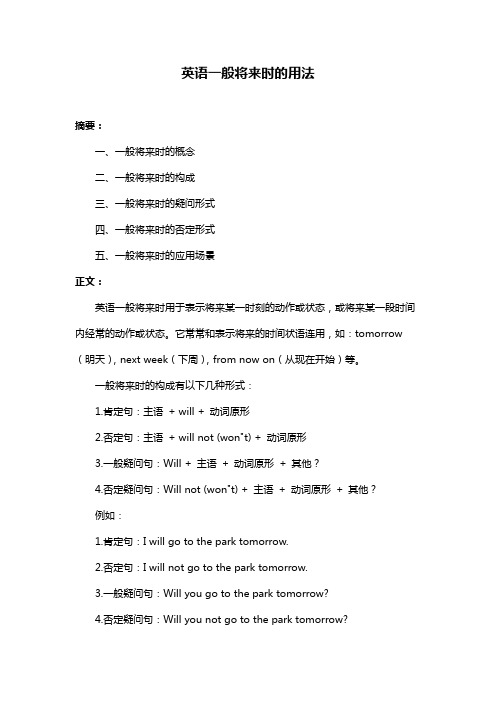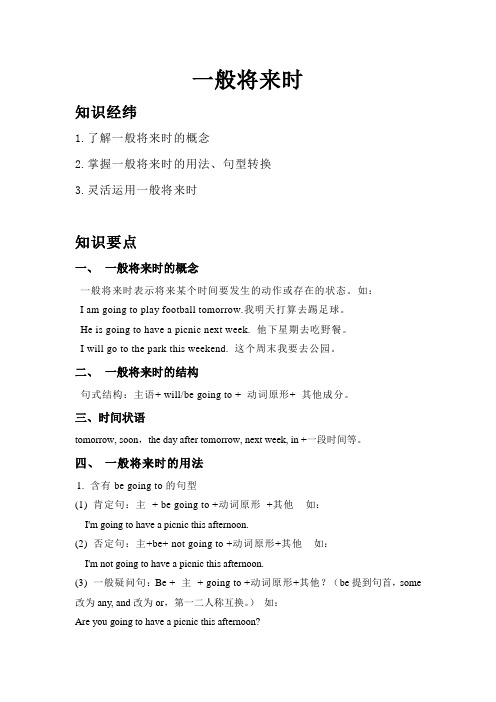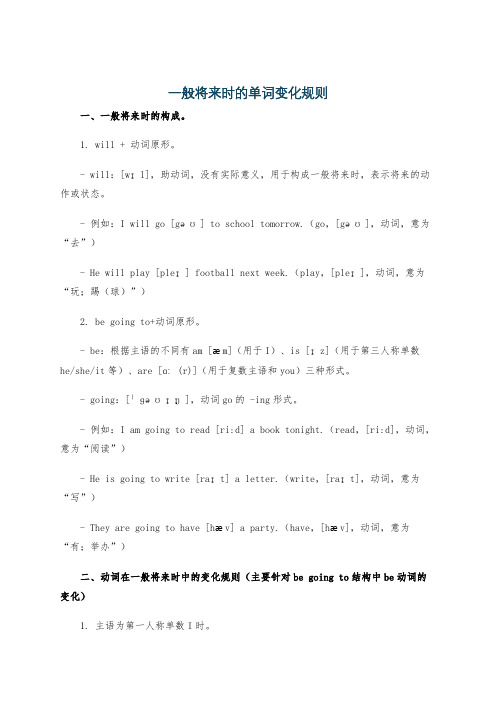一般将来时
-一般将来时的四种句型

一般将来时的四种句型1. “主语+will+动词原形”句型。
哎呀,比如说,“I will go shopping tomorrow.”(我明天会去购物。
)你看,这多简单直接呀,我就是明确地表达了我明天要去做的事情呢。
2. “主语+be going to+动词原形”句型。
嘿,就像“He is going to play basketball this afternoon.”(他今天下午打算去打篮球。
)这不是很清楚地说出了他的计划嘛。
3. “will be+形容词/名词”句型。
哇塞,“It will b e sunny tomorrow.”(明天会是晴天。
)这样就能轻松描述未来的状态啦。
4. “be going to be+形容词/名词”句型。
你想想,“She is going to be a great singer.”(她将会成为一名很棒的歌手。
)多有憧憬呀!5. “主语+will+be+动词的现在分词”句型。
像“ They will be waiting for us at the station.”(他们将会在车站等我们。
)多形象呀!6. “主语+be going to+be+动词的现在分词”句型。
“We are going to be having a party tonight.”(我们今晚将会举行一个派对。
)是不是很带感?7. “will+have+过去分词”句型。
“I will have finished my work by 5 p.m.”(到下午 5 点我将会完成我的工作。
)多有成就感呀!8. “be going to+have+过去分词”句型。
“They are going to have built the house by next month.”(到下个月他们将会建好那所房子。
)多厉害呀!9. “will+动词原形+其他成分”句型。
“He wille and help you.”(他会来帮助你。
英语一般将来时的用法

英语一般将来时的用法
摘要:
一、一般将来时的概念
二、一般将来时的构成
三、一般将来时的疑问形式
四、一般将来时的否定形式
五、一般将来时的应用场景
正文:
英语一般将来时用于表示将来某一时刻的动作或状态,或将来某一段时间内经常的动作或状态。
它常常和表示将来的时间状语连用,如:tomorrow (明天),next week(下周),from now on(从现在开始)等。
一般将来时的构成有以下几种形式:
1.肯定句:主语+ will + 动词原形
2.否定句:主语+ will not (won"t) + 动词原形
3.一般疑问句:Will + 主语+ 动词原形+ 其他?
4.否定疑问句:Will not (won"t) + 主语+ 动词原形+ 其他?
例如:
1.肯定句:I will go to the park tomorrow.
2.否定句:I will not go to the park tomorrow.
3.一般疑问句:Will you go to the park tomorrow?
4.否定疑问句:Will you not go to the park tomorrow?
一般将来时在实际应用中非常广泛,可以用于描述未来的计划、预期、愿望等。
一般将来时

一般将来时知识经纬1.了解一般将来时的概念2.掌握一般将来时的用法、句型转换3.灵活运用一般将来时知识要点一、一般将来时的概念一般将来时表示将来某个时间要发生的动作或存在的状态。
如:I am going to play football tomorrow.我明天打算去踢足球。
He is going to have a picnic next week. 他下星期去吃野餐。
I will go to the park this weekend. 这个周末我要去公园。
二、一般将来时的结构句式结构:主语+ will/be going to + 动词原形+ 其他成分。
三、时间状语tomorrow, soon,the day after tomorrow, next week, in +一段时间等。
四、一般将来时的用法1. 含有be going to的句型(1) 肯定句:主+ be going to +动词原形+其他如:I'm going to have a picnic this afternoon.(2) 否定句:主+be+ not going to +动词原形+其他如:I'm not going to have a picnic this afternoon.(3) 一般疑问句:Be + 主+ going to +动词原形+其他?(be提到句首,some 改为any, and改为or,第一二人称互换。
)如:Are you going to have a picnic this afternoon?肯定回答:Yes, I am.否定回答:No, I’m not.2. 含有will的句型(will可用于所有人称,shall只用于第一人称I和we)( 1 ) 肯定句:主+ will +动词原形+其他如:I will play football tomorrow.(2) 否定句:主+ won’t +动词原形+其他(will后加not成won't)如:I won’t play football tomorrow.(3) 一般疑问句:Will + 主+ +动词原形+其他?(will提到句首,some改为any, and改为or,第一二人称互换) 如:Will you play football tomorrow?肯定回答:Yes, I will.否定回答:No, I won’t.五、一般将来时的特殊疑问句一般情况下,一般将来时的对划线部分有三种情况。
一般将来时的单词变化规则

一般将来时的单词变化规则一、一般将来时的构成。
1. will + 动词原形。
- will:[wɪl],助动词,没有实际意义,用于构成一般将来时,表示将来的动作或状态。
- 例如:I will go [gəʊ] to school tomorrow.(go,[gəʊ],动词,意为“去”)- He will play [pleɪ] football next week.(play,[pleɪ],动词,意为“玩;踢(球)”)2. be going to+动词原形。
- be:根据主语的不同有am [æm](用于I)、is [ɪz](用于第三人称单数he/she/it等)、are [ɑː(r)](用于复数主语和you)三种形式。
- going:[ˈɡəʊɪŋ],动词go的 -ing形式。
- 例如:I am going to read [ri:d] a book tonight.(read,[ri:d],动词,意为“阅读”)- He is going to write [raɪt] a letter.(write,[raɪt],动词,意为“写”)- They are going to have [hæv] a party.(have,[hæv],动词,意为“有;举办”)二、动词在一般将来时中的变化规则(主要针对be going to结构中be动词的变化)1. 主语为第一人称单数I时。
- be动词用am。
例如:I am going to visit ['vɪzɪt] my grandparentsthis weekend.(visit,['vɪzɪt],动词,意为“拜访”)2. 主语为第三人称单数(he/she/it等)时。
- be动词用is。
例如:She is going to sing [sɪŋ] a song at the concert.(sing,[sɪŋ],动词,意为“唱歌”)3. 主语为第二人称you或者复数(we/they等)时。
一般将来时态讲解(共25张PPT)

• I don't think the test will be very difficult. 。
②用于“祈使句 + and + 陈述句” 中
I don’t think it will rain this afternoon.
I am hungry. I think I’ll have something to eat.
表示看法,观点
“There be”句型的一般将来时 肯定句: There will be +名词+其他成份 [注意]:无论后面加单数名词或复数形式,be都必须用原形。
shall适用于第一人称I,We;而will适用于所有人称。 通常可以用will来代替shall。 will,shall均可缩写为:'ll,如:
I will= I'll; she will = she’ll;will not 和shall not分别可以 缩写为 won't 和shan't。
1.一般将来时的用法
4. be about to + 动词原形。 表示 (1)“即将做”或“马上做”
(2)因此,句子不能再用时间状语。
Don’t leave. Li Lei is about to come. 不要走了,李蕾就要来了。 Be quiet. The concert is about to start. 安静下来,音乐演唱会就要开始了。
• My uncle will come to see me every Saturday.
• 我叔叔每个星期六都会来看我。
• The students will have five English classes per week this term.
一般将来时动词变化规则

一般将来时动词变化规则一般将来时是英语中常用的时态之一,用于表示将来发生的动作或状态。
下面是一般将来时动词变化规则的详细介绍。
一般将来时的肯定句结构为:主语 + will + 动词原形 + 其他。
一般将来时的否定句结构为:主语 + will not(won't)+ 动词原形 + 其他。
一般将来时的疑问句结构为:Will + 主语 + 动词原形 + 其他?一般将来时动词变化规则总结如下:1. 对于大多数动词,一般将来时的肯定句中直接使用动词原形即可,不需要进行任何变化。
例如:I will go to the cinema tomorrow.(我明天会去电影院。
)2. 对于第三人称单数形式的动词,一般将来时的肯定句中需要在动词原形后加上-s或-es。
例如:He will study English next year.(他明年会学习英语。
)3. 对于以辅音字母+y结尾的动词,一般将来时的肯定句中需要将y 改为i,然后再加上-es。
例如:She will fly to London next week.(她下周会飞往伦敦。
)4. 对于以“辅音字母+元音字母+辅音字母”结尾的重读闭音节动词,一般将来时的肯定句中需要双写最后一个辅音字母,然后再加上-es。
例如:They will stop by the supermarket on their way home.(他们回家的路上会顺便停一下超市。
)5. 对于以“辅音字母+元音字母+辅音字母”结尾的非重读闭音节动词,一般将来时的肯定句中只需要在动词原形后直接加上-es。
例如:It will fix the car tomorrow.(明天它会修理汽车。
)6. 对于以“e”结尾的动词,一般将来时的肯定句中只需要在动词原形后直接加上-s。
例如:We will dance at the party tonight.(我们今晚会在派对上跳舞。
)7. 对于以“ie”结尾的动词,一般将来时的肯定句中需要将“ie”改为“y”,然后再加上-s。
一般将来时
一般将来时一、一般将来时的定义:一般将来时表示将来某一时刻的动作或状态,或将来某一段时间内经常的动作或状态。
常见的一些表示将来的时间状语,如:tomorrow(明天),next week/month/year(下周/月/年),from now on(从现在开始);in the future(将来),this Sunday(这个周日),in two years(两年内)等。
二、一般将来时的形式:1.在肯定句中,will 常简略为'll,并与主语连写在一起,如:I'll,he'll, she'll,it'll,we'll,you'll,they'll。
2.一般将来时中,一般疑问句的形式:(1) Will you…?—Yes,I will. 或No, I will not(=won't);(2) Shall you…?—Yes,I shall. 或No, I shall not.(3) Be(am/is/are)+主语+going to+动词原形+其它+?如:Are you going to swim tomorrow?—Yes, I am./ No, I'm not.Is he/she going to play football next weekend?—Yes, he/she is./ No, he/she isn't.Are they going to go shopping this Sunday?—yes, they are./ No, they aren't.三、一般将来时的用法:1.一般将来时由“助动词shall(用于第一人称),或者will(用于第一、二、三人称)+动词原形”构成。
这种将来意义常常夹杂着情态意义即带有说话人的主观态度和看法,比如表示“预见”。
有时也含有“意愿”或“意图”的意思。
一般将来时总结
一般将来时总结一般将来时(Simple Future Tense)是英语中表示将来发生的动作或状态的一种时态。
本文将对一般将来时进行详细总结,包括形式、用法以及相关的时间状语等内容。
一、一般将来时的形式:一般将来时的基本形式由助动词“will”或“shall”加上动词原形构成。
例如:- I will go to the park tomorrow.(我明天会去公园)- They shall arrive at the airport at 10 o'clock.(他们将在10点到达机场)当主语为第三人称单数(he/she/it)时,“will”后的动词原形需要加上“s”或“es”。
例如:- She will study for the exam next week.(她下周会复习考试)- It will rain tomorrow.(明天会下雨)二、一般将来时的用法:1. 表示计划或意图:用一般将来时可以表达主语打算或计划要做的事情。
例如:- I will visit my grandparents this weekend.(我这个周末会去看望我的祖父母)- He will study abroad next year.(他明年将会去留学)2. 表示预测或推测:一般将来时可以用于表示根据当前的情况或证据所做出的预测或推测。
例如:- I think it will snow tomorrow.(我认为明天会下雪)- They believe she will win the competition.(他们相信她会赢得比赛)3. 表示意愿或允诺:一般将来时可以表达主语的意愿或承诺要做某事。
例如:- I will help you with your homework.(我会帮你做作业)- He will stop smoking.(他将戒烟)4. 表示预定的事件或安排的计划:一般将来时可以用于表示已经安排好的事件或计划。
一 般 将 来 时
一般将来时一、意义:表示将来某个时间要发生的动作或存在的状态,也表示将来经常或重复发生的动作。
时间标志:tomorrow , soon ,next Monday , next year , next weekend , this afternoon , this evening ……二. 构成及变化:一般将来时常用的两种结构be going to+动词原形: 表示打算、准备做的事或即将发生或肯定要发生的事。
shall/will+动词原形: 表示将要发生的动作或情况,没有太多的计划性, 还用来表示意愿⑴be going to +动词原形㈠肯定句主语+be(am /,is,/ are) going to +动词原形+其它成份My sister is going to learn English next year.我姐姐准备明年学英语。
㈡否定句主语+be(am / is / are)not going to +动词原形+其它成份I am not going to(go to)the cinema tonight.我今天晚上不打算去看电影。
㈢一般疑问句Be (am / is / are)+主语+going to+动词原型+其它成份…?Is your father going to play basketball with you ?你父亲打算和你去打篮球吗?No , he isn’t.不。
㈣.特殊疑问句特殊疑问词(Wh-)+一般疑问句?Where are you going to spend Spring Fesital.?春节你打算在哪过?㈤.注意: be going to 结构后面习惯上不跟go ,come 等表位移的动词,一般用该动词的进行时形式表示。
如: He’s going to New York next week.下周他要去纽约.⑵.will /shall +动词原形(在书面语中,主语是第一人称时,常用shall ,在口语中,所有人称都可以用will)1.肯定句主语+will/shall+动词原形+其它成份(shall) write to him next week.下周我将给他写信。
一般将来时的四种句型结构
一般将来时的四种句型结构一般将来时句型结构一般将来时用于表达未来将要发生或可能发生的动作或状态,其主要句型结构有四种:1. will + 原形动词- 主语 + will + 原形动词 + 其他成分- 例如:- I will go to the store later.(我稍后会去商店。
)- We will have a meeting tomorrow.(我们明天将开会。
)2. shall + 原形动词(疑问句或肯定句中主语为 I/we)- 主语(I/we)+ shall + 原形动词 + 其他成分- 例如:- Shall I open the window?(我打开窗户好吗?)- We shall arrive at 10:00 AM.(我们将在上午 10:00 到达。
)3. be going to + 原形动词- 主语 + be going to + 原形动词 + 其他成分- 例如:- I am going to watch a movie tonight.(我今晚要去看电影。
)- They are going to build a new house.(他们打算建造一所新房子。
)4. be + about to + 原形动词- 主语 + be about to + 原形动词 + 其他成分- 例如:- I am about to leave.(我就要走了。
)- The train is about to depart.(火车就要出发了。
)一般将来时的用途一般将来时主要用于以下几种情况:- 表达未来将要发生的肯定动作或事件- 表达未来可能发生的动作或事件- 表示计划或打算- 表达预测或推测- 表示请求或建议(使用 shall 时)- 表示承诺或保证(使用 will 时)。
- 1、下载文档前请自行甄别文档内容的完整性,平台不提供额外的编辑、内容补充、找答案等附加服务。
- 2、"仅部分预览"的文档,不可在线预览部分如存在完整性等问题,可反馈申请退款(可完整预览的文档不适用该条件!)。
- 3、如文档侵犯您的权益,请联系客服反馈,我们会尽快为您处理(人工客服工作时间:9:00-18:30)。
Unit 6 Beyond time and space (I) (Language)学案
Class ____________ Name: __________ Number:__________
学习目标:
1.掌握一般将来时的句型结构。
2. 掌握常见的表示将来的时间状语。
3. 重点句型:○1will do/ won’t do.
○2be going to do.
基础训练
I、完成句子
1.学生们这周六将去种树。
The students plant trees this Saturday.
2.我们的老师很快就会回来吗?
teacher back soon?
3.今天下午他们不踢足球。
They to play football this afternoon.
4.明年李明就十岁了。
Li Ming ten years old next year.
5.从现在开始你会努力学习吗?
hard from now on ?
6.我打算下周去香港旅游。
I Hong Kong next week.
7.周末我要和妈妈去购物。
I with mum this weekend.
8.她打算呆在家里做家务。
She’s at home to do housework.
9.明天嘉敏帮Lucy学汉语。
Jiamin Lucy her Chinese tomorrow.
10.他们计划周末去野餐。
They a picnic this weekend.
II 单项选择:
1. When your mother return? Shall I wait for her?
A. will
B. do
C. is
D. does
2. They a competition next week.
A. are going to
B. are going to have
C. are going to be
D. will be
3. We must finish our work two days.
A. in
B. at
C. on
D. for
4. It’s hard for a child the jungle.
A. to get cross
B. get across
C. to get through
D. get through
5. I will go swimming rather than basketball.
A. play
B. played
C. to play
D. playing
6. you be at home at seven this evening?
A. Will
B. Are
C. Shall
D. Do
7. He her a beautiful hat on her next birthday.
A. gives
B. gave
C. will give
D. give
8. My grandparents will back to Beijing soon.
A. goes
B. going
C. went
D. go
9. He in three days.
A. comes back
B. came back
C. will come back
D. shall come back
10. Charlie here next month. He has got a new job in another city.
A. isn’t working
B. won’t work
C. is going to work
D. doesn’t work
11. There a dolphin show in the zoo tomorrow evening.
A. has
B. is going to have
C. will have
D. is going to be
12. Uncle Tom will come back .
A. next month
B. in next month
C. on next month
D. at next month
13. The key is used for the door.
A. open
B. opening
C. to open
D. opened
14. They arrive Beijing nine the evening.
A. in; in; in
B. at; at; at
C. in; at; in
D. at; at; in
15. --- I have been to the Great Wall.
--- .
A. So I have
B. So have I
C. I have so
D. I so have
16. – Will he come to the party this evening?
-- .
A. Yes, he comes
B. Yes, he won’t
C. No, he won’t
D. No, he will.
III 完型填空
Shenzhou VI lifted off (起飞) from Jiuquan Satellite Launch Centre (卫星发射中心) 9:00 am Oct 12, 2005 for a five-day mission. It carried (带着) air pilots Fei Junlong and Nie Haisheng. It entered a orbit 21 minutes later. Shenzhou VI around the for 119 hours or nearly days and in the Inner Mongolian grasslands.
Shenzhou V carried Yang Liwei and circled the earth for 21 hours in October 2003. It made only the country after the United States and former Soviet Union to the feat (业绩).
( )1. A. at B. on C. in D. above
( )2. A. army B. man C. force D. people.
( )3. A. long B. fixed C. man-made D. earth
( )4. A .flied B. ran C. went D. circled
( )5. A. moon B. earth C. sun D. space.
( )6. A. three B. four C. five D. six
( )7. A. got B. reached C. crashed D. landed
( )8. A. China B. French C. German D. Australia.
( )9. A .first B. second C. third D. fourth.
( )10A.have B .remember C. achieve D. like.。
